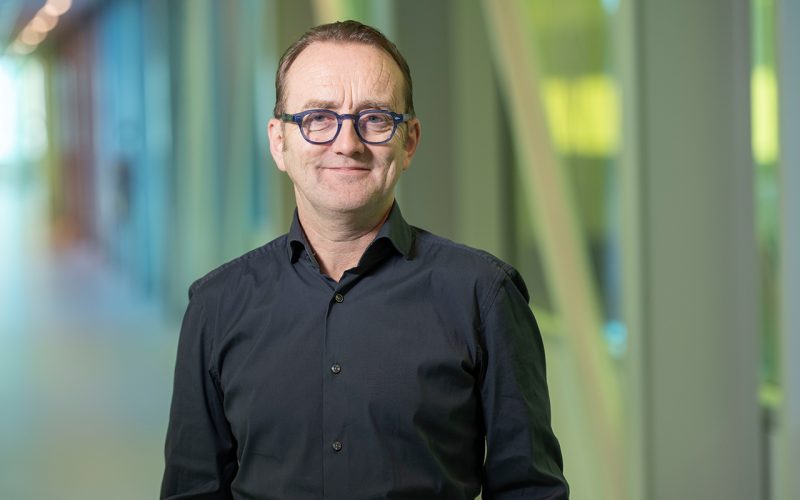Willem Verpoest, professor of reproductive medicine, delivered his oration titled ‘The cycle of life is a bicycle’ on Thursday 23 January. In his talk, he discussed ways in which people with a desire to have children can best be helped to get pregnant. He also talked about the ethical questions that arise in this process.
One in six people face fertility problems. When people with a desire to have children do not succeed in becoming pregnant, they can go to the reproductive medicine treatment centre at UMC Utrecht, where care, scientific research and education are in full swing.
And within that special patient population, there is a specific group of wishing parents with whom Willem Verpoest will also be involved in the coming years. Willem himself is a father of three growing children. Willem on the wider trend: ‘Due to positive developments in healthcare, young people with a serious hereditary condition are also fortunately becoming more and more mature. Their desire to have children is often accompanied by all kinds of questions that used not to be asked because these young people unfortunately did not get around to having children. Living longer leads to more life-course care, a nice development.’
Appropriate counselling in the period before pregnancy until the 10th week of pregnancy and research into the long-term consequences of a severe hereditary defect are crucial for these future parents. And more scientific research in this area is important. With his years of clinical experience and broad scientific knowledge, Willem Verpoest has come to UMC Utrecht to work on this substantively.
Willem Verpoest obtained his PhD in 2010 and worked as department head of Reproduction and Genetics at Brussels IVF with a team of 180 researchers and healthcare professionals for an annual number of IVF cycles of 5500+ of which 900+ PGT cycles. He is an expert on reproductive genetics, PGT (preimplantation genetic testing) and reproductive immunology. He was president and member of the Society for Fertility Study VFS, the Flemish Working Group on Reproductive Medicine (VWRG) and currently president of the Belgian Society for Reproductive Medicine (BSRM). He is internationally recognised as a clinical scientist in reproductive medicine with considerable expertise
For people who are both carriers of a gene or genes that cause an inherited disease, such as Cystic Fibrosis, muscle disease SMA or Haemophilia A/B, a desire to have children is a topic where people ask each other and their doctor how to deal with the likelihood that their child will also have to deal with the consequences of a chronic disease.
Willem Verpoest: ‘In my view, predictability of fertility is paramount here, but the patient’s choice is central. In my role as a doctor, I respect the choice that people with a desire to have children make. We can share information about probabilities with people. Some people with a hereditary disease in the family then choose to see what life brings them. Others would like to prevent their future child being born with an inherited disease. There are good arguments for both sides.’
Technologically, more and more is possible in this area. People with a desire to have children who know that, for example, breast cancer or Cystic Fybrosis runs in the family can get tested for those specific genes. If it turns out that the wishing parents are also carriers of the gene then they can choose to become pregnant using a pre-implantation genetic test (PGT). Then a selected embryo that does not carry the specific gene is introduced into the womb via ivf treatment. This technique also raises many ethical issues regarding social engineering and the frameworks within which we consider a person healthy. ‘These kinds of issues have my full attention and I will also focus research on them. Within the UMC Utrecht, there are fortunately opportunities for plenty of cooperation and dialogue with medical ethicists and also patients.’
For Willem Verpoest, the collaboration at UMC Utrecht and its partners has got off to a prosperous start. For example, he works closely with Marta Villani and her team. She works as an associate professor at the Faculty of Veterinary Medicine and as a researcher at UMC Utrecht, where, as a clinical embryologist, she studies how errors occur in the distribution of chromosomes in women’s egg cells. When these cells have the wrong number of chromosomes, it can affect fertility.
He is also increasingly collaborating with colleagues from the strategic theme Child Health and the Princess Maxima Centre. ‘We would like to give young patients of today the right prognoses about their future health. We also want to inform them as well as possible about their fertility and the chances of being able to have a child in the future. Partly because this contributes to the dialogue on how we can protect them from the loss of fertility, for example in chemotherapy and radiotherapy. It becomes even more life-cycle care’
